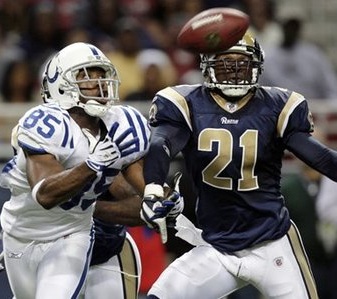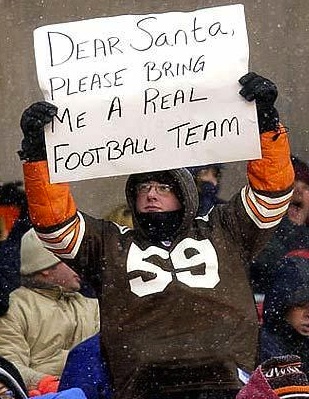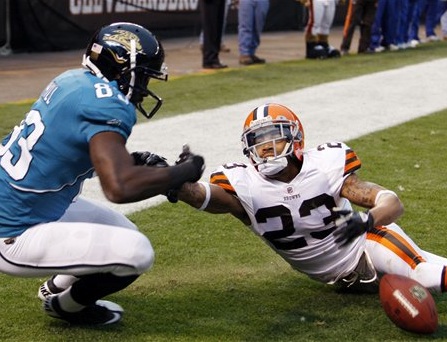 Browns Archive
Browns Archive  For NFL, Draft Lottery Still a "Doomsday Game" Away
For NFL, Draft Lottery Still a "Doomsday Game" Away
 It’s Week 17 in the NFL, and a do-or-die docket of Cowboys vs. Giants and Tebow vs. Orton sure sounds like a fortunate bit of clairvoyant scheduling. In the league offices, though, they're actually even more pleased about a certain game NOT happening this week. I’m talking, of course, about Colts vs.Rams-- a potentially catastrophic, draft-order doomsday scenario that's been narrowly avoided again.
It’s Week 17 in the NFL, and a do-or-die docket of Cowboys vs. Giants and Tebow vs. Orton sure sounds like a fortunate bit of clairvoyant scheduling. In the league offices, though, they're actually even more pleased about a certain game NOT happening this week. I’m talking, of course, about Colts vs.Rams-- a potentially catastrophic, draft-order doomsday scenario that's been narrowly avoided again.
Road to Doomsday, Part 1: When Losing is Winning
For those fans perversely unversed in the National Football League’s seedy underbelly of god-awful teams outside of Cleveland, this is basically how it breaks down right now. When the regular season concludes this week, the #1 pick in next April’s NFL Draft will belong to either the Indianapolis Colts or the St. Louis Rams. As it stands, both teams are 2-13, with Indy wrapping up their season in Jacksonville and the Rams hosting the 49ers.
If we were talking about the NBA or the NHL, these sorts of late season draft position tug-of-wars would amount to little more than a reach for a few extra lottery balls. In the lottery-free NFL, however, the stakes are much more concrete: losing, simply put, is how you “win.” The league still determines its draft order the old fashioned way, focusing solely around winning percentage (the lower it is, the higher your pick), with tiebreaks based on strength of schedule (the shittier your opponents, the rosier your draft placement). This sounds logical enough at first, with the idea that the teams that lose the most (especially to other bad teams) are most in need of help. Like a welfare reform debate, though, the argument will eventually arise as to whether there are enough incentives in place to encourage the league’s doormats to actually bother trying to improve their standing over the course of the season. If losing nets you the greatest rewards (presuming the American Dream known as the Playoffs was never really a possibility to begin with), why exactly should a team even consider trying to win a comparatively meaningless game in December?
This is obviously a pretty old conundrum that the NFL has been tiptoeing around for years, and it’s hardly limited to the teams battling it out for the bottom rung. Our beloved Browns are in this boat annually, of course, putting their perpetually shell-shocked fans in the doubly awkward spot of having to not only watch the Browns lose to the hated Steelers AGAIN, but kinda sorta having to be pleased with that result, as well. With no lottery, there is no possibility of the Browns lucking into a higher draft spot than their final record would have handed them. As a result, you get your ever-growing segment of the fanbase that astutely—if a bit obnoxiously—cheers for short-term failure as a path to long-term success. Then, in response to that philosophy, you get the old school purists screaming bloody murder, seeing the “Suck-for-Luck” contingent and their ilk as passionless dickheads on par with (or maybe even worse than) the fantasy geeks.
And those crusty old purists might have a point. When it all comes down to it, a sporting event should not pose a lot of internal conflicts for the spectator. Once he’s pledged allegiance to his chosen team, he should be able to cheer for that team to win every time they play, whether it’s for a playoff spot on the line or just a little post-holiday pick-me-up. Basically, I should never want my team to lose.
Part 2: Playing the System
So, it's pretty easy to see the serious competitive (and psychological) flaws in the current NFL draft system, which actually makes it kind of a shame that the Colts and Rams aren’t playing each other this week. By avoiding this sort of doomsday game—with the reward awaiting the loser-- the NFL has a much easier time brushing its legitimate on-field integrity issues under the rug once again. Playing hundreds of miles apart, the Colts and Rams may not put out 100% effort this week, or send out the players that would put them in the best position to win—but their eventual fates could just as easily be placed at the feet of their opponents-- the Jaguars (who hardly benefit from winning, either) and the Niners (who are shooting for a #2 seed in the playoffs, but locked up their division long ago). This fuzzy grey area of "did they lose or did they get beat?" is suitable enough to support the clichés spouted by every head coach who’s ever captained one of these bottom barrel teams: “we’re going out there to win.” “We’re not focusing on anything right now outside of ending this season on a good note with a victory.” Fine, fine. But should you be?
If the system is flawed, you might as well acknowledge it and use it to the best advantage for your football team. In other words, if Indianapolis is all gaga for Stanford QB Andrew Luck (as Mel Kiper says they better damn well should be), and Luck is clearly the best player available in the draft, you simply CANNOT sacrifice the potentially massive value of that selection for the joyless half-accomplishment of beating the effing Jags in a game no one will watch, let alone remember. It might be against everything the game is supposed to stand for, but it’s also unquestionably the wiser course of action if you want to avoid being in the exact same position a year from now. Today's sacrifice is tomorrow's feast. Or something like that.
Part 3: Raising the Stakes for the "Suck Bowl"
The picture might even get clearer if we remove Andrew Luck from the equation, since some people are souring on him. Let’s go with a hypothetical fictional superstar in his place—some sort of transcendent, once-in-a-century athletic freak who racks up a trio of Heismans and makes Kiper bawl like a baby every time one of his highlights is shown. Imagine that this kid has declared himself eligible, and that 100% of ESPN analysts and humanity in general agree he will eventually make both Jim Brown and Joe Montana look like talentless stiffs by comparison. If this wunderkind were on the board, and the 2-13 Colts were in St. Louis to play the 2-13 Rams in an otherwise meaningless season finale… what would happen? Seriously? Would the teams even bother pretending they wanted to win the game? Would one or both attempt a forfeit? Would they secretly agree to play to a tie? How many fights would break out? Fake injuries? Would the final few minutes come down to some suspicious, Shurmur-esque clock management? Or would both squads give it their all for the full 60, thus sending their respective cities into bizarro fits of reverse rage?
Any way you slice it, it'd be ugly. And the scariest thing about this nightmarish “Suck Bowl” circumstance is that it’s really not all that far-fetched. It’s come close to happening plenty of times before, and there is no doubt that teams have already tanked it in somewhat similar situations. So, what’s to be done?
Part 4: Lott-o-ideas
Well, the lottery is certainly the easy answer. And a practical one, too. The fact is, the gap between a 2-14 football team and a 4-12 team is less than negligible in the grand scheme of things. A lottery would help discourage late season tanking by taking away the automatic rewards of being the worst. All the teams in the pool of suck would still have their shot at a top pick, even if they committed the sin of winning a couple games down the stretch.
 Another random idea would be to adjust the current tiebreaker system, moving strength of schedule behind the more intriguing comparison of head-to-head matchup. As a further twist, though, the team that had won a head-to-head contest during the regular season would not be punished for being “better,” but actually rewarded with the higher pick (or, in cases of multi-team tiebreaks, rewarded for having the highest winning percentage against the other teams in the pile-up).
Another random idea would be to adjust the current tiebreaker system, moving strength of schedule behind the more intriguing comparison of head-to-head matchup. As a further twist, though, the team that had won a head-to-head contest during the regular season would not be punished for being “better,” but actually rewarded with the higher pick (or, in cases of multi-team tiebreaks, rewarded for having the highest winning percentage against the other teams in the pile-up).
So, for example, if the Browns and Jaguars both finish 5-11 this year, the Browns would actually reap the benefits of having beaten Jacksonville this season—getting to pick ahead of the Jags in the draft by one spot. The purpose, in theory, would be to add a little intrigue to games between shitty teams— offering incentives for these clubs to outplay one another on the field, rather than simply rewarding the losing team with an edge in draft position. It’s not as if the strength of schedule tiebreak was the great end-all-be-all statistic anyway, so why not give these clubs something to play for?
There are likely hundreds of other possible integrity fixes floating around the internet, giving potential lottery towns like Cleveland something else to ponder in place of playoff football. But in the long run, the NFL probably won’t see fit to change its ways until the day when that doomsday Suck Bowl scenario finally rears its ugly head, and the nauseating sight of two teams trying (and needing) to lose finally flicks on the light bulb in the Commissioner’s office.
- NBA Announces 2013-2014 Schedule
- Browns Ink Sharknado
- Sharknado A No-Show For Rookie Camp
- Trent Richardson Out Until Training Camp
- Browns Sign Brandon Jackson
- Carrasco Suspended Eight Games
- Browns Add to Wide Receiver Depth with David Nelson
- Browns Need to Learn from Past Draft Mistakes
- Browns Release Chris Gocong and Usama Young
- Browns Missing on Grimes Disappointing, But Not The End
The TCF Forums
- Movies coming out
rebelwithoutaclue (Tuesday, January 21 2014 12:56 PM) - 2015 Recruiting
jclvd_23 (Tuesday, January 21 2014 12:38 PM) - The 2014 Offseason Thread
Larvell Blanks (Tuesday, January 21 2014 12:25 PM) - Official- Browns Coach Search/Rumors
Larvell Blanks (Tuesday, January 21 2014 11:53 AM) - Chris Grant's first 3 drafts
Kingpin74 (Tuesday, January 21 2014 10:13 AM) - Mike Brown
YahooFanChicago (Monday, January 20 2014 11:15 PM) - 2014 Hoops Hockey Hijinx
jpd1224 (Monday, January 20 2014 4:44 PM) - 2014 Recruiting
jclvd_23 (Monday, January 20 2014 2:26 PM) - Wish List - #4 Pick
Hikohadon (Monday, January 20 2014 1:26 PM) - #1 overall pick Anthony Bennett
TouchEmAllTime (Sunday, January 19 2014 1:28 PM)


